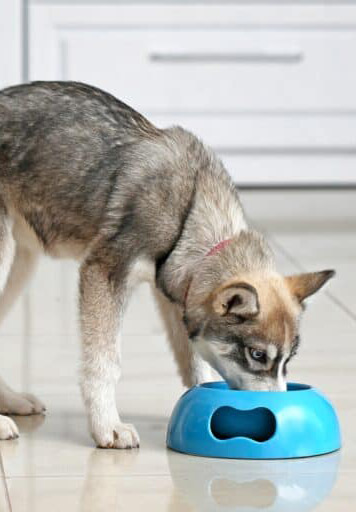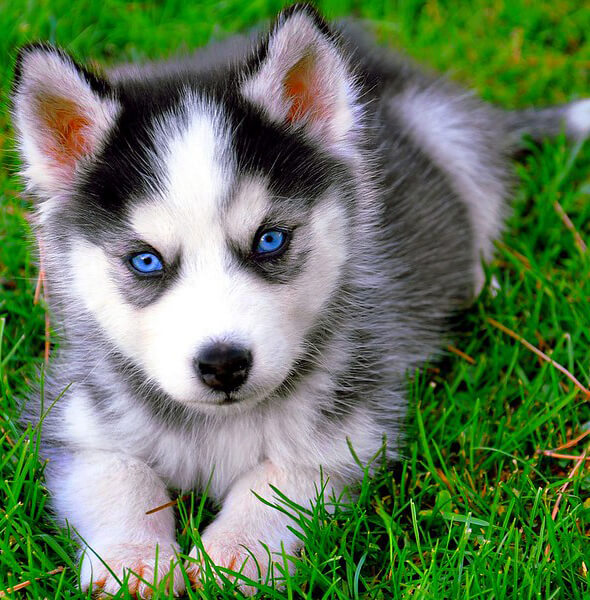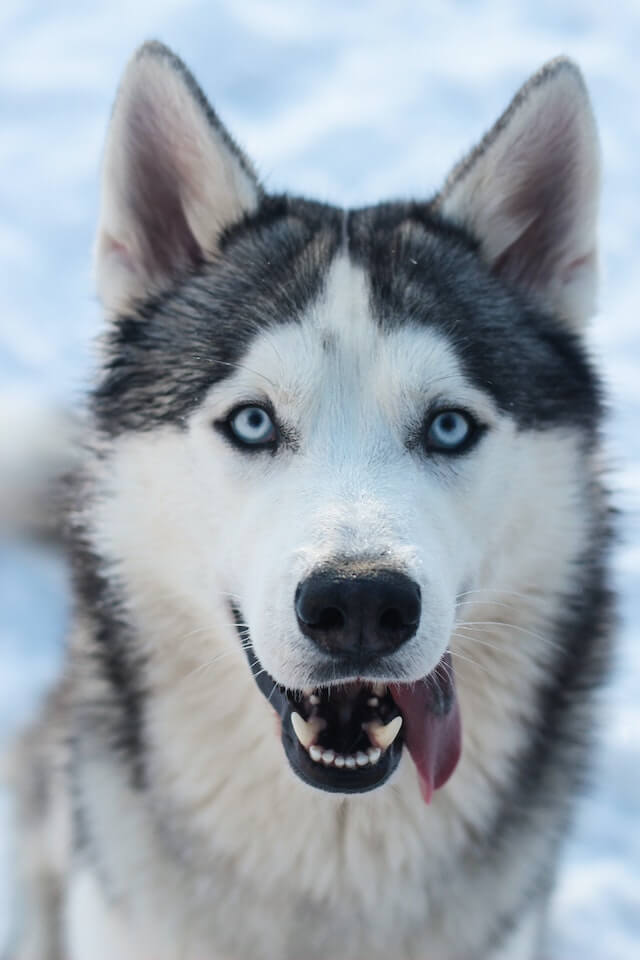Understanding Siberian Husky Pregnancy
Learn everything you need to know about Siberian Husky pregnancy, from pre-pregnancy care to post-pregnancy care.Siberian Huskies are a beautiful, intelligent and highly energetic breed that are known for their striking blue eyes, wolf-like appearance, and their impressive endurance. They have been bred over centuries by the Chukchi people of northeastern Asia to work as sled dogs in harsh Arctic conditions. Today, they remain a popular breed because of their loyalty, playfulness and outgoing personalities.
Table of Contents
ToggleResponsible breeding is essential to producing litters that are healthy for the mother and the puppies. As with any breed, it’s crucial to comprehend the Siberian husky pregnancy process in order to spot any potential health issues early on and provide the mother dog and her babies the attention they need. Understanding your dog’s pregnancy process can also help you mentally and physically get ready for birth day.
Knowing what changes to expect at each stage of your Siberian husky’s pregnancy will also enable you to recognize any warning signs and seek veterinarian assistance if needed.
Pre-Pregnancy Care of Siberian Husky Pregnancy
Health check-ups and vaccinations
It is essential to have your Siberian Husky thoroughly examined by a reputable veterinarian before considering breeding. The dog’s physical condition, including any obvious illnesses or injuries, will be assessed by the veterinarian, who will also ensure sure the dog has received all required vaccines.
Canine distemper virus, parvovirus, and rabies are a few frequent illnesses that pregnant dogs may develop. Your Siberian Husky can help protect the safety of both the mother and her unborn puppies by receiving a preventative vaccination against certain illnesses.
Proper nutrition and exercise for Siberian Husky Pregnancy
A successful pregnancy in your Siberian Husky depends on a balanced diet full of nutrients. Make sure to provide your dog a high-quality meal full of protein, vitamins, minerals, and other necessary ingredients before breeding them.
Maintaining a healthy weight is particularly crucial since underweight or overweight dogs may have trouble getting pregnant or carrying their litter. Additionally, regular walks and games with toys can keep your dog’s muscles toned. Proper exercise is crucial for keeping your dog fit for pregnancy.

Breeding considerations
If your Siberian Husky satisfies certain requirements, such as being at least two years old and having gotten a veterinarian’s certification that they are free from any genetic problems that could be passed on to their progeny, breeding should only be considered. You should also think about whether you have adequate space to house the puppies until they are old enough to go to their new homes or whether you have the financial means to care for possibly big litters of puppies. Before deciding to breed your own animals, it is always advisable to do some research on trustworthy breeders. This will provide you an understanding of the procedures that must be followed before breeding can occur.
Pregnancy Stages of Siberian Husky Pregnancy
First trimester: Changes in behavior and physical appearance
A Siberian Husky’s first trimester of pregnancy is an exciting and important period for both the expecting mother and her owner. The dog’s body goes through a lot of changes at this stage as it gets ready to give birth. A decrease in activity is one of the first observable changes as the dog’s body focuses its energy on developing and caring for her puppies.
At this point, it’s crucial to provide your child the rest and nutrients they need to maintain healthy development. During the first trimester, there may be behavioral changes in addition to physical ones.
Some dogs could go through mood changes or show their owners more affection. They might also exhibit symptoms of nausea or morning sickness, which can be treated with dietary changes or, if necessary, medication.
Second trimester: Growth and development of puppies
The developing puppies have a time of tremendous growth throughout the second trimester. They now have distinct facial features such a nose, eyes, and mouth, and are beginning to resemble baby versions of their parents. For the mother’s health and the health of her developing fetuses, good diet is crucial during this stage.
Owners should be on the lookout for symptoms of discomfort, such as decreased appetite or lethargy, which could be warning signals of infection or hypoglycemia. If needed, ultrasounds can assess the size of the litter and confirm fetal viability.
Third trimester: Preparing for delivery
The third trimester is the time to start getting ready for the birth. As she creates a nesting space for herself and her puppies, the mother could become agitated or pace more frequently.
Owners are responsible for providing a cozy area that won’t be disturbed while a person is giving birth. Due to the increased energy needs of the developing puppies, dogs often experience an increase in hunger at this time.
A well-balanced diet that is rich in protein and calories is crucial. Owners should also speak with their veterinarian about any potential issues during labor and how to set up for a smooth delivery.
In general, responsible ownership and ensuring the health and welfare of both the mother and her puppies depend on knowing the different stages of pregnancy.
Siberian Husky Delivery Process
Signs of Labor
Stages of Labor
There are three phases of labor that your Siberian Husky will experience. The first stage lasts anywhere from six to eighteen hours and starts when she begins to exhibit indicators that she is going to give birth. Your dog can start vomiting or panting hard at this time.
The actual delivery step, which usually lasts about an hour per dog but may take longer if there are issues, comes next. The third stage starts when your dog expels the placenta after the final puppy is born.
Caring for Newborn Puppies of Siberian Husky
Before letting each puppy nurse with its mother, make sure you clean off any bodily fluids and dry them with a fresh towel. During the first few weeks of life, puppies should nurse often to ensure that they receive all the nutrients necessary for healthy growth and development. You should give your newborn puppies plenty of blankets or a heating pad set on low below their bedding in addition to making sure they are nursing properly.
As pups have weakened immune systems compared to adult dogs, keep an eye out for any potential health problems including infections or parasites. Other signs to look out for include lethargy or diarrhea.

Post-Pregnancy Care
Recovery Period for the Mother Subarian Husky
Siberian Husky women need time to rest and recover after giving birth in order to regain their health and vigor. This is especially true if the mother has a challenging delivery or if she had a sizable brood. It’s critical to give her a relaxing environment free from distractions and noise where she may unwind.
The mother should be kept under close observation for indications of infection or other complications during the recovery phase, which normally lasts between two and four weeks. Along with lots of food and water, she should also get any required drugs that a veterinarian prescribes.

Caring for the Puppies
Newborn Siberian Husky puppy care demands a lot of tolerance, focus, and commitment. They are totally reliant on their mother for food, warmth, and safety during the first few weeks of life.
It’s crucial to keep them in an environment that’s warm, tidy, and free from drafts and harsh temperatures. To make sure the puppies are growing at the proper rate, they should be weighed frequently.\
Additionally, they should be watched for any disease or distress indicators, such as lethargy or appetite loss. It’s crucial to give children toys and socializing activities that foster the development of their physical and social skills as babies become more mobile and active.
Weaning Process
It’s time to start weaning the puppies off of their mother’s milk and onto solid food when they get closer to being 4-6 weeks old. To prevent stomach discomfort or stress on the puppies’ systems, this process should be carried out gradually over a number of days.
Commercial puppy food can be combined with homemade pureed foods, such as cooked chicken combined with rice and veggies, or softened kibble. It may take several weeks for the puppies to make the switch from milk to solid food, during which time their general health and weight gain should be watched.
Maintaining regular contact with a veterinarian who can offer advice and support during this crucial time is crucial throughout the post-pregnancy period.
Frequently Asked Questions
A Siberian Husky pregnancy typically lasts for 63 days.
Some of the signs of Siberian Husky Pregnancy:
- Increased appetite
- Weight gain
- Decreased activity level
- Vomiting
- Swollen vulva
- Milk production
Siberian Huskies are beautiful and intelligent dogs that make great companions. If you are thinking about breeding your Siberian Husky, there are a few things you need to know.
First, you need to make sure that both your dog and the male you are breeding her with are healthy and of good breeding stock. You can do this by having both dogs screened for genetic diseases and by checking their pedigrees.
Once you have found a suitable mate, you need to time the breeding correctly. The female is only fertile for a few days each month, so it is important to breed her during this time. You can have your veterinarian help you determine when your dog is in heat.
Once the breeding is successful, you will need to provide your dog with good prenatal care. This includes feeding her a high-quality diet, giving her plenty of exercise, and taking her to the veterinarian for regular checkups.
When the puppies are born, you will need to care for them properly. This includes feeding them, cleaning them, and socializing them.
Breeding Siberian Huskies can be a rewarding experience, but it is important to do your research and to be prepared for the challenges. If you are not sure if you are ready to breed your dog, it is best to consult with a veterinarian or experienced breeder.
Here are some additional tips for breeding Siberian Huskies:
- Make sure that both dogs are up to date on their vaccinations.
- Keep the male and female dogs separate until you are sure that the female is pregnant.
- Provide the female dog with a clean and comfortable place to give birth.
- Monitor the female dog closely during labor and delivery.
- Keep the puppies warm and dry after they are born.
- Weigh the puppies regularly to make sure that they are gaining weight.
- Deworm the puppies at the appropriate age.
- Start socializing the puppies at a young age.
- Neuter or spay the puppies when they are old enough.
Breeding Siberian Huskies is a big responsibility, but it can also be a very rewarding experience. By following these tips, you can help ensure that your breeding is successful and that your puppies are healthy and happy.
Physical changes
In the first few weeks of pregnancy, your Husky may not show any signs of being pregnant. However, as the pregnancy progresses, you will start to notice some physical changes, such as:
- Increased appetite
- Weight gain
- Swollen breasts
- A swollen abdomen
- Nesting behavior
Emotional changes
Your Husky may also experience some emotional changes during pregnancy, such as:
- Increased affection
- Increased anxiety
- Decreased activity level
- Irritability
It is important to be patient and understanding with your Husky during this time. She may be feeling a lot of different emotions, and she may need extra love and attention.
A pregnant Siberian Husky should get plenty of exercise. However, you should avoid strenuous activity.
When your Siberian Husky is ready to give birth, you should create a safe and comfortable birthing area for her. You should also have a towel or blanket on hand to catch the puppies.
Once your Siberian Husky has given birth, you should monitor her and the puppies closely. If you have any concerns, you should contact your veterinarian.
- Provide your Husky with a high-quality diet. A pregnant Husky needs a diet that is high in protein and fat. You can feed her a commercial dog food that is specifically designed for pregnant dogs, or you can make her food at home. If you choose to make her food at home, be sure to consult with your veterinarian to make sure that it is balanced and nutritious.
- Give your Husky plenty of exercise. A pregnant Husky still needs exercise, but you should avoid strenuous activity. Stick to short walks and other low-impact activities.
- Take your Husky to the veterinarian for regular checkups. Your veterinarian will be able to monitor your Husky’s health and make sure that she is getting the nutrients she needs. They will also be able to answer any questions you have about pregnancy and birth.
- Create a safe and comfortable birthing area for your Husky. The birthing area should be clean, dry, and private. You can use a dog bed, a crate, or a box for the birthing area.
- Be prepared for labor and delivery. Labor and delivery can be a long and tiring process. Be prepared to stay with your Husky for the duration of labor and delivery. You may also want to have someone else on hand to help you if needed.
- Monitor your Husky and her puppies closely after birth. After birth, you will need to monitor your Husky and her puppies closely for signs of infection or other problems. You should also weigh the puppies regularly to make sure that they are gaining weight.
- Get help from a veterinarian if needed. If you have any concerns about your Husky’s pregnancy, labor, or delivery, be sure to contact your veterinarian. They will be able to provide you with the care and support you need.

